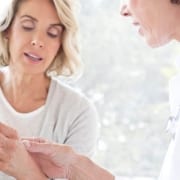8 Common Myths About Arthritis
Arthritis is a condition where joints become inflamed and cause pain. It is a common condition affecting more than 50 million Americans. With as many as one in four adults suffering from arthritis, many arthritis myths surround the condition and treatments for it. Here are a few arthritis myths.
Myth # 1 Once you turn a certain age, you will have arthritis
Many people believe that arthritis only happens to senior citizens. That is not true. Arthritis can and does afflict people of all ages. There are babies and toddlers with arthritis as well as teenagers and young adults. Arthritis can start at any age.
Myth # 2 If your parents or grandparents had arthritis, you will too.
While it is true that you can get some things from your parents, like eye color and skin color, and your genetic makeup includes some ancestral traits, like hair color and the shape of certain facial features, it is not true that you will be afflicted with the same medical conditions as they.
There are too many variables to predict whether or not you will have arthritis. Those variables include your lifestyle: your diet, where you live, what you do for work, and how active you are.
Myth # 3 Over-the-counter medications won’t help arthritis
Not every condition requires a prescription. An occasional flare-up of arthritis may not warrant a prescription. Sometimes over-the-counter medications will reduce the pain associated with inflamed joints.
Myth # 4 If you take pain medications for arthritis, you will always need to take them
Pain management for arthritis might include pain medications as prescribed by your doctor but that doesn’t mean that you will need to take them all the time.
Depending on your activities, the environment around you, your diet, and your outlook on life, you might only need them when experiencing severe symptoms. Many times, a change in one of your lifestyle areas can help manage pain from arthritis.
Myth # 5 Holistic approaches to arthritis are a waste of time
Crazy approaches to healthcare management that are not based on scientific evidence are likely to be a waste of time. Natural holistic approaches to arthritis can be extremely beneficial. Taking doctor-approved dietary supplements may help in some instances of arthritis.
Adopting good lifestyle practices may include a diet change, like reducing your salt intake and limiting the consumption of fried foods, which can help decrease inflammation and thereby reduce pain.
Eating more fiber-rich foods, like healthy green vegetables (spinach, green beans), cruciferous vegetables (broccoli, cabbage, and kale), protein-rich foods (legumes, pinto beans, black beans), and fruit (like apples, berries, and bananas) are natural and healthful dietary choices.
Myth # 6 If you have arthritis pain, you should stay in bed
Unless the pain is so severe that it completely immobilizes you, staying in bed won’t help your arthritis. Activities that get your blood pumping are helpful when dealing with arthritis.
Gentle stretching and incorporating movement exercises, like practicing yoga and walking, can help get your joints moving and blood circulating to reduce inflammation and pain.
Myth # 7 If you crack your knuckles or knees, you will have arthritis
No. Popping your knuckles, knees, neck, or back will not make you get arthritis. Doing excessive repetitive motions can wear on the joints. Doing a variety of activities will reduce the stress associated with one set of joints.
Myth # 8 You should never use an ice pack, hot water bottle, or heating pad on your joints
You should use whatever will give you the most relief. If using an ice pack on an inflamed area helps relieve some of the symptoms, then use it but check with your doctor first. The same goes for using a hot water bottle if your joints feel cold. The only thing to be aware of is using a heating pad. Using a heating pad can be problematic if you fall asleep with it on, especially if you are a diabetic.
Due to diabetic neuropathy (nerve damage from diabetes) after a while, you may not feel the heating pad. If you are a diabetic and fall asleep with a heating pad on a painful joint, you can risk damage to the skin and the tissue underneath because of being unaware of the constant heat.
Cano Health can offer patients a personalized plan, as well as a proactive approach to wellness. They can even offer medical transportation to and from one of their medical centers. If you are looking for compassionate health professionals who care for and treat people with arthritis, contact Cano Health.



